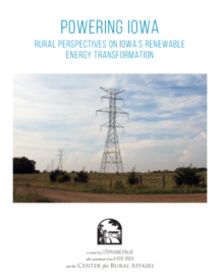As the renewable electricity sector grows in Iowa and across the Midcontinent Independent System Operator (MISO) footprint, rural stakeholders increasingly experience both benefits and drawbacks from wind, solar, and electric transmission line development.
Renewable energy infrastructure and investment create jobs in rural communities, generate property tax dollars for rural counties, and provide landowners with annual or one-time payments. At the same time, renewable energy development raises concerns among rural stakeholders including: the use of eminent domain for transmission projects; fair treatment and compensation; and potential nuisance issues. Rural residents also wonder about their fair share of benefits, such as increased reliability and decreased electricity bills.
To better understand rural stakeholder beliefs and experiences with this changing energy economy, the Center for Rural Affairs surveyed elected county officials in all 99 Iowa counties as well as landowners and managers who recently were impacted by a transmission line project in north central Iowa. We received 84 responses from elected officials and six responses from landowners or operators. Here, we present survey results and provide recommendations for transmission developers to further improve how they interface with rural communities.
We found that local elected leaders tend to support wind energy development, especially when they see local economic benefits. Survey responses also indicate strong support for solar energy, though respondents with positive attitudes toward wind are not necessarily more likely to support solar. A majority of county supervisors and auditors understand that transmission lines improve grid reliability, efficiency, and access to renewable energy. When deciding whether to support a transmission project, respondents’ top priorities include fair treatment by developers, preservation of agricultural land, and provision of local economic benefits.
While we had a low response rate to our landowner survey, most respondents had a positive experience with the transmission developer. They also provided insight into how developers can further improve interactions with local stakeholders when negotiating an easement contract.
For a two-page summary of this report, check out "Report Recap: Powering Iowa."


